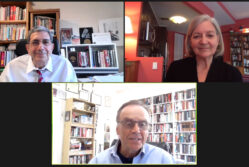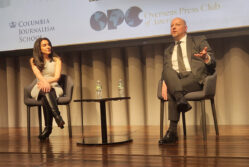
Power Plays Protect Putin, Not Russians, Author Says
Does Putin’s chutzpah mask insecurity?
Gregory Feifer, author of Russians: The People Behind the Power, thinks so. Talking about his new book March 31 at the Overseas Press Club, Feifer said Russian President Vladimir Putin’s decision to invade Ukraine and seize Crimea was designed to make him look tough at the expense of the Russian people.
“Putin has been good at muddying the waters, saying it’s to protect Russian speakers,” Feifer said. “But trying to foment a civil war on Russia’s southern border is not good for Russia or its citizens.”
Russians will have to spend hard-earned rubles to prop up Crimea’s economy, just as they are doing in South Ossetia and Abhazia, two regions with sizeable Russian-speaking populations Russia recognized as independent after a 2008 war with Georgia, another former Soviet republic. Meanwhile, millions of Russians live in poverty while oligarchs close to Putin live like tsars. But the prices of oil and gas—Russia’s lifeblood—are being pressured by new supplies partly created by the shale boom in the United States.
“One reason Putin cracked down on protestors and Pussy Riot is that he is worried that the gravy train is ending and he wants to make sure he has control of the system,” Feifer said. “If oil prices fall, it will be a serious problem. The elites may abandon Putin or support someone else.”
Feifer, a former NPR correspondent, said if the West wants to exert influence on Putin, it must figure out a way to show Russian citizens that what Putin is doing is not good for Russia.
That’s not easy. By invading Ukraine, Putin is appealing to Russians’ nostalgia for the country’s lost superpower status, Feifer said.
In answer to a question from the audience, Feifer said he thinks most Western coverage of Russia is fair. But he noted that many Westerners–governments and media alike—naïvely believed that Russian Prime Minister Dmitry Medevedev, who served as the country’s president from 2008 to 2012, was a reformer.
“Medvedev served as a westernized liberal façade for Putin who was really pulling the strings,” Feifer said.
In his book, Feifer draws on his family history and his decade of experience as a journalist in Moscow to create a portrait of today’s Russia from the bottom up.
“Russia is a country of contrasts and paradoxes. It has the world’s largest land mass, but much of it is uninhabitable, with bitterly cold winters. Coping with such conditions has reinforced the idea that people need to live in groups to survive, and that individuals acting alone are weak. That’s led to a kind of fatalism that suggests trying to change anything singlehandedly is futile.”
Joshua Rubenstein, who reviewed the book for The New York Times, was the interlocutor at the Book Night. Rubenstein, a longtime Associate at Harvard University’s Davis Center for Russian and Eurasian Studies, praised Feifer’s book as being “grounded in history and culture.”



